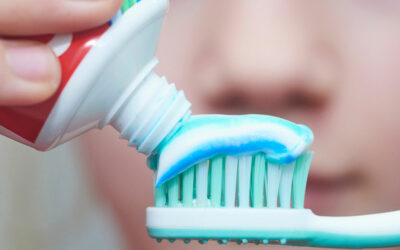Did you know oral health is closely linked to overall health? Keeping your teeth, mouth, and gums healthy is an essential part of your well-being.
Maintaining healthy teeth and gums takes commitment for a lifetime. Sticking with healthy habits helps keep your smile bright and prevents oral health issues from arising.
In this blog, we’ll cover the most important habits for good oral health so you can maintain teeth that look great and function as they should. Here are our top 10 tips for a healthy smile.
-
Floss At Least Once a Day
Many people know the importance of brushing their teeth — which is great! — but there is another crucial step for caring for your mouth: flossing.
Along with removing any debris that may be stuck in your teeth after eating, flossing helps reduce plaque, stimulate the gums, and lower inflammation.
For those who find flossing difficult (young children, individuals with arthritis), the right tools can make it far easier to maintain a flossing routine. Ask your dentist if you need a recommendation for a flossing tool.
Benefits of flossing daily include:
- More effective than brushing alone
- Reduce plaque
- Stimulate the gums
- Lower inflammation
- Prevent gum disease
- Prevent tooth decay
- Removes debris and bacteria from areas brushing cannot reach
- Prevent tartar buildup
- Prevent bad breath
-
Always Brush Your Teeth Before Bed
The general recommendation for good oral health is to brush your teeth at least twice a day. However, it is important to make sure that at least one of these brushing sessions is before you go to bed.
Brushing before bed rids the mouth of any plaque and germs that have accumulated during the day and prevents them from building up further while you sleep.
During the day, saliva helps wash away food debris and neutralise your mouth’s acid level. At night, saliva production decreases, allowing bacteria and plaque to damage tooth enamel through the night.
-
Brush Properly
Brushing improperly is almost as bad as skipping brushing entirely. Take your time and move the brush gently in circular motions. This ensures any plaque is cleared away before it hardens and leads to gingivitis and calculus buildup.
It is also important to use a soft-bristled toothbrush and avoid overbrushing so you do not damage your gums.
Not sure if an electric toothbrush or manual toothbrush is better? Check out our in-depth article on choosing between a manual or electric toothbrush.
-
Don’t Forget to Brush Your Tongue
Plaque doesn’t just build up on teeth — it can also build up on your tongue! This can lead to bad breath and other oral health issues. Every time you brush your teeth, gently brush your tongue as well.
A coated tongue may indicate issues with food debris, toxins, fungus, or other health complications.
Along with brushing or scraping your tongue, here are more tips to keep your tongue healthy:
- Avoid smoking
- Avoid excessive alcohol consumption
- Drink enough water
- Get regular oral health checkups
- Limit your sugar consumption
-
Use a Fluoride Toothpaste
Toothpaste is often categorised according to its whitening power or flavour, but it is also important to choose a toothpaste that features fluoride as an ingredient.
Fluoride has long been a mainstay in caring for a healthy mouth, and for good reason. It defends against tooth decay by fighting off germs and forming a protective barrier over teeth.
If you are interested in switching to a fluoride toothpaste or want to know the best fluoride toothpaste, ask your dentist for a recommendation.
-
Consider Including Mouthwash In Your Oral Hygiene Routine
We find that many people skip mouthwash without realising how effective it is. It helps maintain good oral health in three ways:
- Reduces the amount of acid in the mouth
- Cleans areas in the mouth and gums that are hard to reach
- Helps re-mineralise the teeth
For older individuals or young children that struggle with flossing properly, mouthwash can be a particularly helpful tool for maintaining a healthy mouth.
It is important to use mouthwash at a separate time of day from brushing. Since mouthwash contains less fluoride than toothpaste, using mouthwash immediately after brushing can reduce the benefits of fluoride toothpaste. We suggest spitting the excess toothpaste out and not rinsing with anything (even water) and using mouthwash at a separate time of day.
There are a variety of mouthwash types available, from brands that work best for sensitive teeth to types that are specifically formulated for children. Prescription mouthwash is also an option. Ask your dentist for the best mouthwash recommendations.
-
Drink Enough Water
Along with being the best beverage for supporting your overall health, water also supports oral health. In addition to getting the recommended daily water intake, it is helpful to drink water after every meal or snack. This can help rinse away debris and acids in between brushing.
The benefits of drinking water for oral health include:
- Helps ensure adequate saliva production
- Helps prevent dry mouth
- Rinses away food debris and sugar particles
- Helps maintain a healthy pH level in the mouth
- Hydrates the gums
-
Eat Foods for Healthy Teeth
Along with supporting your overall health, the right foods can also contribute to healthy teeth.
With minerals, antioxidants, and vitamins, crunchy fruits and vegetables are an excellent way to support your overall health. Fresh fruits and vegetables help scrub away food particles from teeth and contain fibre, a key nutrient for healthy teeth and gums.
Foods with fibre help keep gums and teeth clean to increase your defence against gum disease and cavities. One of the biggest benefits of fibre-rich foods is the amount of chewing they require.
During the chewing process, saliva production is stimulated. Saliva is a natural antibiotic and can:
- Help prevent acids and enzymes from attaching teeth and promoting decay
- Help prevent the formation of bacteria in the mouth
- Help prevent sugars from sticking to the teeth
- Restore minerals to areas of the teeth that have been damaged by bacterial acids (saliva contains trace amounts of phosphate and calcium)
Some of the best foods for healthy teeth include:
- Apples
- Celery
- Carrots
- Cheese, Yoghurt, and Milk
- Pears
- Leafy greens (kale, lettuce, spinach)
- Nuts
- Fatty fish (phosphorus to help protect tooth enamel)
- Berries
- Broccoli
- Garlic (powerful antimicrobial properties to fight decay)
- Onions
- Sweet potatoes (vitamin A for healthy gum tissue)
- Kiwis
-
Limit Acidic and Sugary Foods
Sugar turns to acid in the mouth and puts teeth at risk of enamel erosion and cavities. Certain teas, acidic fruits, and coffee can also have a negative impact on tooth enamel.
You do not necessarily have to cut these foods out entirely, but it is important to be aware of their potential impact. Using mouthwash immediately after consuming sugary foods or acidic drinks can help protect your enamel by neutralising the acids. However, avoid brushing right after consuming acidic food or drinks as you can scrub the softened enamel off.
Some of the worst foods for teeth include:
- White bread
- Sour candies
- Carbonated drinks
- Chewing on non-food substances such as pens, fingernails, and ice
- Acidic fruits such as lemons and limes (these are fine in moderation, but avoid squeezing lemon or lime juice into your water and sipping it all day)
- Sticky foods that cling to teeth
- Sweetened beverages
- Sugary foods, baked goods, and candies
- Alcohol
- Extremely hard foods
-
See Your Dentist At Least Twice a Year for Check-ups
Keeping up with the habits mentioned above is crucial for your oral health and can go a long way in maintaining a healthy mouth. However, even the most committed brushers and flossers must see a dentist regularly (at least twice a year).
The benefits of regular dental checkups include:
- Remove calculus and plaque build-up
- Check for cavities and decay
- Monitor the health of teeth, gums, and the tongue
- Spot potential oral health issues — gingivitis, gum disease, oral cancer — early before they lead to complications such as gingivitis and oral cancers
- Instruction on brushing and flossing properly and product recommendations
- Save money in the long run by treating oral health issues early



In Need of a Dental Checkup?
Are you overdue for your dental checkup or in need of a certain dental treatment? We invite you to contact our experienced team of dental professionals. Dr. Jack Brazel, Dr. Kevin Keyhani, and the caring staff at 123 Dental are dedicated to providing you with the most advanced dentistry so you can enjoy a healthy smile for a lifetime.






